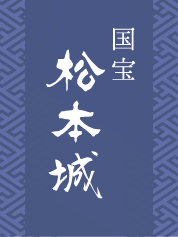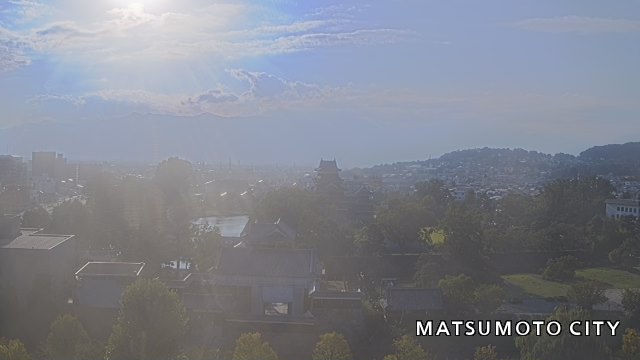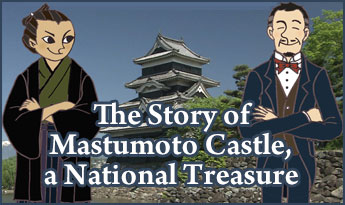Structure of the castle town
Residential areas of samurai warriors and the places of temples and shrines
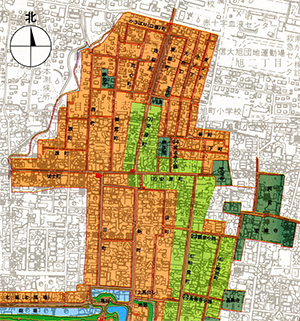
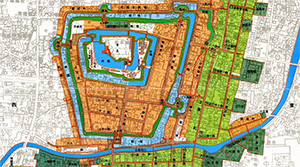
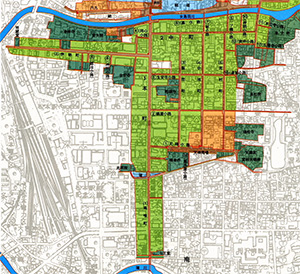 Residential areas of samurai warriors are orange, residential areas for merchants is green, the areas for temples and shrines are dark green.
Residential areas of samurai warriors are orange, residential areas for merchants is green, the areas for temples and shrines are dark green.
*Click to enlarge.
Residential areas of samurai warriors
The castle tower and palaces were built in Honmaru building of Matsumoto Castle, surrounded by inner moats. Ninomaru building was established outside the moats, having two palaces and warehouses surrounded by outer moats. Sannomaru building where warriors having high salaries lived was built outside the Ninomaru, surrounded by outer moats. These buildings are all included in the castle.
As there were not enough residential areas for warriors in Sannomaru, the number of residences were gradually increased outside Sannomaru. These are the east area along the outer moats and the north part of the castle town. Please see the "establishment of castle town" section for the information regarding the expansion of these areas. In the area expanded to the north, there were residences for lower-class warriors including "kachi" and "ashigaru." Also, there were some warrior residences in the areas where merchants lived.
The areas for temples and shrines
The areas for temples and shrines were placed at the outermost of the castle town. Let's have a look at the details on establishment of temples and shrines by referring to "Shimpu-tōki."
The era of Sadayoshi Ogasawara (1582-1590)
Jorinji Temple was moved from Hayashimura (Matsumoto-shi Satoyamabe) to Isecho. Shoanji Temple was moved from Doromachi to Honmachi. Zuishoji Temple was moved from Iidamachi to Miyamuramachi. Honryuji Temple was moved from Jizo-Shimizu to Uwatsuchi.
The era of Kazumasa and Yasunaga Ishikawa (1590-1613)
Shogyoji Temple was moved from Kuribayashi (Matsumoto-shi Shimadachi) to Rokku. It was moved from Rokku to the east part of Shimoyokotacho at the age of Yasunaga. Gokurakuji Temple was moved from Kuribayashi to the south area of the Metoba river.
The era of Hidemasa Ogasawara (1613-1617)
Tenjin Shrine was moved from Kamata to Miyamura.
The era of Yasunaga Toda (1617-1633)
Anrakuji Temple was moved from the south part of Okachimachi to the east part of Izumicho.
The era of Masamori Hotta (1638-1642)
Honryuji Temple was moved from Uwatsuchi to the east part of Nakacho. Ekoin was built.
The era of Mizuno clan (1642-1725)
Gokurakuji Temple burnt down was rebuilt in the east part of Honmachi.
Oyamachi-Sancho, Edamachi-jucho and Niju-yon Koji
The residential area for merchants spread out vertically along the Zenkō-ji road. There were three main towns called "Honmachi," "Nakacho" and "Higashicho," connecting with 100 towns having 24 alleys linked with each other. The following table shows the relationships among the roads.
| Oyamachi | Edamachi | Koji | "Shimpu-tōki." |
|---|---|---|---|
| Honmachi | Tenjinkoji | Tenjinbabakoji | |
| Nabeyakoji | Nabeyakoji | ||
| Shoanjikoji | Genchikoji | ||
| Doushinkoji | Machidoshinkoji | ||
| Bakuromachi | |||
| Isemachi | Kajikoji | Kajikoji | |
| Shinmeikoji | |||
| Nakamachi | Shinkoji | Shinkoji | |
| Hitotsubashikoji | Hitotsubashikoji | ||
| Urakoji | Kitagawauradori | ||
| Shinmeikoji | |||
| Honryujikoji | |||
| Kofukujikoji | |||
| Iidamachi | |||
| koikemachi | |||
| Miyamuramachi | Koshinkoji | ||
| Furoyakoji | Furoyakoji | ||
| Genchikoji | Genchikoji | ||
| Higashimachi | Yamabekoji | Yamabekoji | |
| Sakuragashikoji | |||
| Shogyojikoji | Shogyojikoji | ||
| Shioyakoji | Shioyakoji | ||
| Futatsuidokoji | Futatsuidokoji | ||
| Sakuzaemonkoji | Sakuzaemonkoji | ||
| Umadashikoji | |||
| Izumimachi | Choshojikoji | Choshojikoji | |
| Kannonkoji | Dochinmachi Niokoji | ||
| Senzaikoji | |||
| Yasuharamachi | Johojikoji | Johojikoji | |
| Kamiyokotamachi | Uramachi | ||
| Shimoyokotamachi | Uramachi | ||
| Yamabekoji | Konyamachi Kajimachi |
